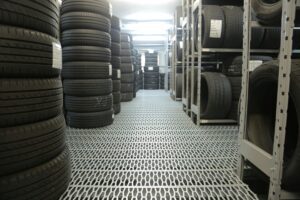All parts of a truck are highly regulated because they have the potential to cause serious accidents. Tires must be regulated on all trucks and approved before they are installed. Indianapolis truck accidents involving tire defects can result in serious injuries to other people on the roadway, which is why it is crucial to keep up with tire maintenance checks. When you have been injured in a collision, reach out to one of our skilled truck accident attorneys for assistance.
If a tire is defective on a truck, it can have various consequences that could potentially harm others on the road, with the most serious being the driver losing the ability to control the truck, thus causing an accident. A defective tire could also result in longer travel time or less gas efficiency. Truck companies in Indianapolis have a duty to use approved tires and monitor them to ensure there are no defects that could cause accidents.
If a tire is defective or overinflated, there is a risk of it exploding. Commercial truck tires are inflated to a very high pressure, which is why overinflation could result in an explosion. An exploding tire presents many hazards, especially injury to a pedestrian. A tire explosion can also lead to the driver losing control of the truck and crashing. It is crucial that drivers and truck companies carefully monitor the pressure in all the tires to avoid these hazards.
 Truck manufacturers and drivers in Indianapolis are responsible for monitoring tires on all vehicles but have differing responsibilities in checking for defects to avoid accidents.
Truck manufacturers and drivers in Indianapolis are responsible for monitoring tires on all vehicles but have differing responsibilities in checking for defects to avoid accidents.
Companies that manufacture tires for trucks must do so in accordance with strict regulations and exact specifications to ensure they do not sell any defective products. If a manufacturing company sells one or more defective tires, they could be held liable if that defect causes an accident. Meanwhile, a truck driver has an independent responsibility to make sure that he or she is using safe tires and monitor them for any defects.
Truck drivers must inspect their vehicles before using them, ensuring the rubber in the tires do not have any defects, they are properly inflated, and that they have not been worn down so as to become less effective. The drivers may have to perform an inspection every time they use the truck, depending on the vehicle itself. Otherwise, a truck driver can inspect the truck and its tires when necessary to avoid any potential accident.
There are strict regulations for designing and manufacturing tires. The tires must meet the requirements of each specific truck model, and a tire manufacturer’s failure to meet those specifications could present a risk to the public. There are several types of hazards that regulations address, such as the tire’s lifespan. After a certain number of miles, tires begin to wear out and must last for a long enough period to be safe. Other hazards include the amount of pressure at which the tire is inflated. If it is overinflated or underinflated, it could result in an accident due to defects.
Drivers in Indianapolis must be familiar with tires on trucks and potential defects to obtain a commercial driver’s license. Such requirements include inspection and maintenance of tires by the driver. It is not sufficient to delegate these responsibilities to someone else; it is the responsibility of the driver to be always driving a safe truck. Failure to inspect and maintain tires on a truck goes against the CDL guidelines and could open them up to a negligence claim.
It is important for truck drivers and manufacturers to understand and execute their duties in tire maintenance to prevent defects from causing major accidents. Either of these parties could be held legally responsible if their defective tires cause crashes resulting in injuries of other drivers on the road. When you have been injured in an Indianapolis truck accident involving tire defects, reach out to one of our experienced lawyers to help you pursue compensation for your injuries. Call today to schedule a consultation.